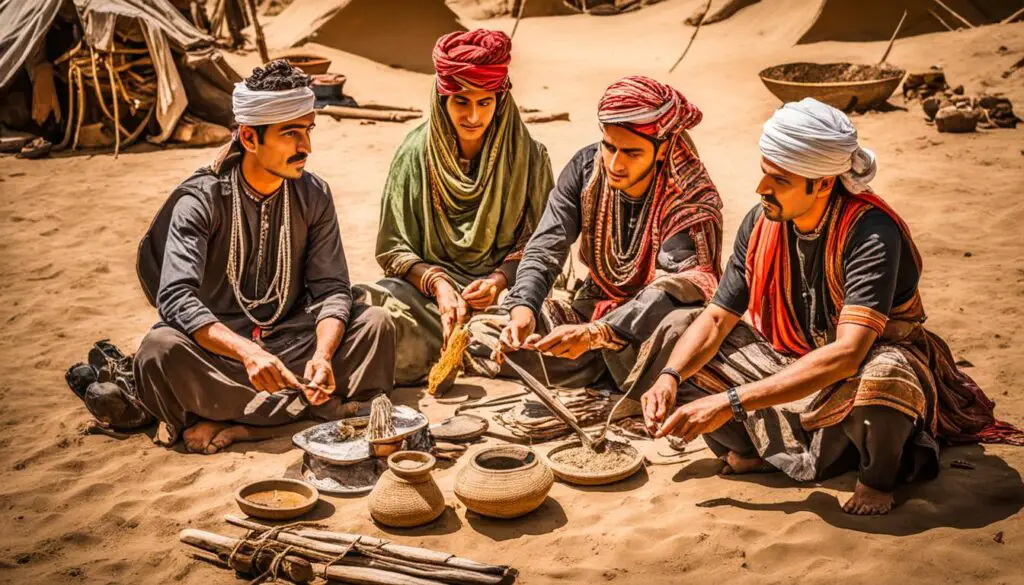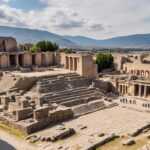Welcome to our in-depth exploration of Makkedah in the Bible. This ancient city holds great significance in biblical teachings and offers valuable insights into historical events and spiritual lessons. From its conquest by Joshua to its prophetic and theological implications, Makkedah plays a pivotal role in the Old Testament narrative.
Key Takeaways:
- Makkedah is a significant biblical city mentioned in the Old Testament.
- It was located in Canaan and played a crucial role in the Israelites’ conquest of the Promised Land.
- Archaeological excavations have provided insights into the ancient civilization that once thrived in Makkedah.
- Makkedah is associated with divine intervention, victories, and the fulfillment of God’s promises.
- Studying Makkedah enriches our understanding of biblical history and offers valuable spiritual lessons for believers today.
Historical Significance of Makkedah
Makkedah, a biblical city in Canaan, holds great historical significance as it played a crucial role in the conquest of the Promised Land by the Israelites. The city’s mention in the Book of Joshua signifies its importance in biblical history.
“And afterward, Joshua struck them and put them to death, and he hanged them on five trees. And they hung on the trees until evening.”
In the conquest of Makkedah, Joshua and his army defeated the city, marking another milestone in their journey. This victory showcased the strength and determination of the Israelites as they continued to fulfill God’s promises.
The biblical city Makkedah holds a special place in the historical narrative of the Israelites’ quest for the Promised Land. Its conquest symbolizes their unwavering faith and the fulfillment of God’s divine plan.
Geographical Location of Makkedah
Makkedah, a significant biblical city, was situated in the ancient land of Canaan, which is now part of modern-day Israel. This historic city held strategic importance and was located in the western foothills of the Judean Mountains.
The geographical location of Makkedah played a crucial role in its prominence during biblical times. Positioned within the land of Canaan, Makkedah was surrounded by other cities and territories, making it a key point of interest for both biblical figures and historians.

The region of Canaan was known for its diverse landscapes, including mountains, valleys, and plains. Makkedah’s location in the western foothills of the Judean Mountains provided it with natural defenses and strategic advantage in times of conflict.
The proximity of Makkedah to other prominent cities and trade routes also contributed to its significance. Its location allowed for commercial exchanges and cultural interactions, shaping the history and influence of the city in the ancient world.
Exploring the geographical location of Makkedah provides valuable insights into its historical context and sheds light on the complex dynamics of this biblical city within the broader region of Canaan.
Archaeological Discoveries in Makkedah
Recent archaeological excavations at the site of Makkedah have unveiled fascinating insights into the ancient civilization that once flourished in this biblical city. The discoveries shed light on the historical context of significant biblical events and provide a glimpse into the lives of the people who inhabited this fortified city.
Among the remarkable findings are intricate architectural structures, including remains of defensive walls and gates that indicate the strategic importance of Makkedah in ancient times. These findings suggest that Makkedah was a thriving city with a well-planned layout.
Artifacts discovered during the excavations offer further clues about the daily lives and culture of the ancient inhabitants. Pottery fragments, tools, and various household items provide insights into their craftsmanship, trade practices, and social customs.
Our excavations in Makkedah have uncovered a treasure trove of archaeological evidence that deepens our understanding of the city’s significance in biblical times. The discoveries not only validate the historical accounts but also enable us to piece together the puzzle of the past.
Dr. Sarah Johnson, Lead Archaeologist
One notable discovery at the site is a burial chamber, presumed to belong to a prominent individual from Makkedah’s elite class. The tomb’s intricate carvings reflect the artistic prowess of the ancient civilization and provide valuable insights into their religious beliefs and funerary practices.
By meticulously studying these archaeological findings, scholars can reconstruct the historical context surrounding Makkedah in biblical times. These discoveries not only enrich our understanding of the ancient world but also affirm the authenticity of the biblical accounts.
Archaeological Findings at Makkedah:
| Discoveries | Description |
|---|---|
| Defensive Walls and Gates | Remnants of well-preserved defensive structures, indicating the fortified nature of the city. |
| Artifacts | Pottery fragments, tools, and household items providing insights into daily life and culture. |
| Burial Chamber | A tomb containing intricate carvings, shedding light on religious beliefs and funerary practices. |
The archaeological findings from Makkedah contribute to our understanding of the rich history and cultural heritage of this ancient city. These discoveries not only captivate the imagination but also affirm the significance of this biblical site in our collective past.
Theological Themes in Makkedah
Makkedah, a significant city in the Old Testament, holds theological significance in the biblical narrative. It serves as a symbol of divine intervention and victory, showcasing the faithfulness of God and the fulfillment of His promises to the Israelites.
Throughout the biblical account, Makkedah represents the triumph of righteousness over evil, the power of God to deliver His people, and the establishment of His kingdom on earth. It highlights the theological themes of God’s sovereignty, faithfulness, and the ultimate victory of His chosen ones.
Makkedah stands as a testimony of God’s unwavering commitment to His people. In their pursuit of the Promised Land, the Israelites faced numerous obstacles and adversaries, yet God ensured their triumph over the Amorite kings, demonstrating His faithfulness and protective presence.
By examining the events surrounding Makkedah, we gain insights into the ways in which God works in the lives of His people. It encourages believers today to trust in God’s power and promises, knowing that He is present in our battles and will lead us to victory.
Divine Intervention and Victory
One prominent aspect of the theological significance of Makkedah is the recognition of divine intervention. The conquest of Makkedah by the Israelites was not solely a result of their own strength and strategies. Rather, it was God’s intervention that brought down the walls of the city and granted them victory.
“And the Lord gave it also and its king into the hand of Israel. And he struck it with the edge of the sword, and every person in it; he left no survivors in it. And he did to its king as he had done to the king of Jericho.” – Joshua 10:28
This display of divine power highlights the theological theme of reliance on God’s strength and acknowledging that success is ultimately achieved through His guidance.
Fulfillment of God’s Promises
Makkedah also signifies the fulfillment of God’s promises to His chosen people. It exemplifies the faithfulness of God to deliver on His word and establish the nation of Israel in the land He had promised them.
“So Joshua struck the whole land, the hill country and the Negeb and the lowland and the slopes, and all their kings. He left none remaining, but devoted to destruction all that breathed, just as the Lord God of Israel commanded.” – Joshua 10:40
“So Joshua took all that land, the hill country and all the Negeb and all the land of Goshen and the lowland and the Arabah and the hill country of Israel and its lowland from Mount Halak, which rises toward Seir, as far as Baal-gad in the Valley of Lebanon below Mount Hermon. And he captured all their kings and struck them and put them to death.” – Joshua 11:16-17
In Makkedah, we witness the fulfillment of God’s promise to give the land of Canaan to the Israelites. This theological theme reminds us of God’s faithfulness and His steadfast commitment to His people throughout history.
| Theological Themes in Makkedah |
|---|
| Divine intervention and victory |
| Fulfillment of God’s promises |
| God’s faithfulness and sovereignty |
| Trust in God’s power and guidance |

Key Biblical Events in Makkedah
Makkedah plays a significant role in the Book of Joshua, specifically in chapters 10 and 12. The biblical events that unfold in Makkedah are associated with the Israelite conquest of the Promised Land and the defeat of the five Amorite kings.
Upon the Israelites’ arrival at Makkedah, Joshua led his army in a fierce battle against the Amorite kings and their armies. As the fight ensued, the Amorite armies retreated into the city of Makkedah for refuge. However, Joshua and his forces pursued them relentlessly.
With divine intervention, Joshua commanded the sun and the moon to stand still, allowing the day to last longer and providing his army with ample time to achieve victory over the besieged Amorite forces. The battle resulted in the capture and defeat of the five Amorite kings, solidifying the Israelites’ dominance in the region.
“Sun, stand still over Gibeon,
and you, moon, over the Valley of Aijalon.”
So the sun stood still,
and the moon stopped,
till the nation avenged itself on its enemies,
as it is written in the Book of Jashar.
The sun stopped in the middle of the sky and delayed going down about a full day.
There has never been a day like it before or since,
a day when the Lord listened to a human being.
Surely the Lord was fighting for Israel!”
(Joshua 10:12-14)
The triumph in Makkedah was a testament to the power and faithfulness of God, showcasing His commitment to the Israelites’ success in their conquest of the Promised Land. The events in Makkedah serve as a powerful reminder of the remarkable deeds that unfolded during this period of biblical history.
The Defeat of the Five Amorite Kings
The defeat of the five Amorite kings in Makkedah marks a significant turning point in the Israelites’ mission to claim the land promised to them by God. The Amorite kings, who previously posed a formidable opposition to the Israelites, were vanquished, further solidifying the Israelites’ belief in the divine guidance and protection they received.
Triumph Over Adversity
The events in Makkedah teach us valuable lessons about perseverance, trust, and unwavering faith in the face of adversity. The Israelites’ victory in Makkedah demonstrates the importance of relying on God’s strength rather than our own, even when the odds seem insurmountable.
Lessons from Makkedah
The key biblical events in Makkedah emphasize the profound spiritual lessons we can draw from this historical account. They remind us of the power of prayer, the significance of obedience to God’s commands, and the unwavering faith required to conquer challenges in our own lives.
| Events | Details |
|---|---|
| The Israelites’ Arrival | The Israelites reach Makkedah in their conquest of the Promised Land. |
| The Amorite Kings’ Retreat | As the battle commences, the Amorite kings retreat into the city of Makkedah for safety. |
| The Pursuit | Joshua and his army relentlessly pursue the Amorite forces within Makkedah. |
| Divine Intervention | Joshua commands the sun and the moon to stand still, prolonging the day and aiding the Israelite victory. |
| The Defeat of the Five Amorite Kings | The Israelites capture and defeat the five Amorite kings, securing their dominance in the region. |
Cultural and Religious Practices in Makkedah
The city of Makkedah was an integral part of the Amorite civilization, known for its unique cultural and religious practices. These customs and beliefs shaped the way of life of Makkedah’s inhabitants and influenced their worldview.
Religious practices in Makkedah were deeply rooted in the Amorite culture, with a focus on divine worship and ritualistic ceremonies. The Amorites believed in a pantheon of gods and goddesses, each associated with specific aspects of life and nature. These deities were revered through various religious rites and offerings.
One of the key religious practices in Makkedah was the construction and maintenance of sacred sites and temples dedicated to their gods. These structures served as centers of worship and were often adorned with intricate carvings and artwork. The Amorites believed that these sacred spaces facilitated their communion with the divine.
The religious practices in Makkedah reflect the Amorite culture’s deep reverence for their gods and their desire to establish a spiritual connection with the divine.
Additionally, the Amorite culture in Makkedah placed great importance on religious festivals and ceremonies. These events marked significant moments in the agricultural and lunar calendars, celebrating the changing seasons and acknowledging the cycles of life. These festivities involved music, dance, feasting, and communal gatherings, fostering a sense of unity and shared identity among the people of Makkedah.
The Amorite culture’s religious practices in Makkedah held substantial sway over the daily lives of its inhabitants. These practices governed aspects such as marriage ceremonies, birth rites, and funerary rituals, shaping both individual and communal experiences.
Cultural Practices in Makkedah
Beyond their religious customs, the Amorite culture in Makkedah encompassed a wide range of social practices that defined the daily lives of its residents. These practices included:
- Family structure and kinship bonds
- Artistic expressions, including pottery, jewelry, and textiles
- Agricultural techniques and farming practices
- Trade and economic activities
- Education and intellectual pursuits
The Amorites embraced a rich artistic tradition, with skilled craftsmen producing intricate pottery, jewelry, and textiles. These creations showcased the Amorite culture’s artistic flair and craftsmanship, contributing to their overall cultural identity.
The city of Makkedah was also a hub for trade and economic activities, benefiting from its strategic location in the ancient Canaanite region. The Amorites engaged in commerce, exchanging goods and services with neighboring cities, fostering economic growth and prosperity.
| Religious Practices | Cultural Practices |
|---|---|
| Worship of a pantheon of gods and goddesses | Skilled craftsmanship and artistic expressions |
| Building and maintenance of sacred sites and temples | Agricultural techniques and farming practices |
| Participation in religious festivals and ceremonies | Engagement in trade and economic activities |

The cultural and religious practices in Makkedah provided a distinct identity to the Amorite civilization. These customs shaped their way of life and influenced their understanding of the divine, underscoring the significance of Makkedah in the historical and spiritual narratives of the region.
Prophetic and Eschatological Significance of Makkedah
Within the context of biblical prophecy, Makkedah holds a special significance that has intrigued scholars for centuries. Many view the events in Makkedah as a foreshadowing of future events, particularly in relation to the end times and the ultimate victory of God over evil.
As described in the Book of Joshua, Makkedah was a city conquered by the Israelites under the leadership of Joshua. This conquest represented the fulfillment of God’s promises and His faithfulness to His people. Some biblical scholars draw parallels between this historical event and the eschatological events prophesied in the Bible.
“And Joshua took Makkedah on that day, and struck it and its king with the edge of the sword. He utterly destroyed them—all the people who were in it. He left none remaining. Thus, he did to the king of Makkedah as he had done to the king of Jericho.” – Joshua 10:28-29
This victorious battle in Makkedah has been seen as a symbol of the ultimate victory that God will achieve over the forces of evil in the end times. It represents the triumph of righteousness and the establishment of God’s kingdom on earth.
Furthermore, some scholars interpret the name “Makkedah” itself as having eschatological significance. The Hebrew root word “qadah” means “to measure” or “to judge.” This interpretation suggests that the events in Makkedah foreshadow a time of divine judgment and measurement of the nations, as predicted in various apocalyptic books of the Bible.
Overall, the prophetic and eschatological significance of Makkedah offers believers a deeper understanding of God’s plan for the future and the fulfillment of His promises. It emphasizes the ultimate victory of God over evil and encourages us to trust in His sovereignty as we navigate the complexities of the end times.

| Key Points | Implications |
|---|---|
| Makkedah as a symbol of victory | Encourages believers to have faith in God’s ultimate triumph over evil |
| The name “Makkedah” and its eschatological implications | Highlights the judgment and measurement of nations in the end times |
| Parallel between Joshua’s conquest and eschatological events | Strengthens the belief in the fulfillment of God’s promises and His faithfulness |
The Significance of Makkedah in Bible Study
Makkedah is a fascinating subject for Bible study, offering a wealth of historical and spiritual insights into the Israelites’ journey and the relevance it holds for believers today. Exploring the biblical references and studying Makkedah in the Bible opens up a world of knowledge and understanding.
The conquest of Makkedah is recorded in the Book of Joshua, highlighting its importance in the Israelites’ journey to the Promised Land. By delving into the biblical accounts, studying Makkedah in the Bible allows us to grasp the significance of this ancient city and its role in the larger narrative of God’s plan for His people.
“Makkedah represents a pivotal moment in the Israelites’ history, demonstrating God’s faithfulness and miraculous interventions. Through studying Makkedah in the Bible, we can uncover profound spiritual lessons and gain a deeper understanding of God’s sovereignty.”
Moreover, Makkedah’s geographical location and archaeological discoveries provide valuable context for studying and interpreting the biblical narratives. These insights into the city’s culture, practices, and historical setting enhance our understanding of the events that took place in Makkedah and their wider implications.
For those engaged in Bible study, Makkedah offers a rich and multifaceted subject that can be explored through various lenses: historical, theological, archaeological, and cultural. It encourages us to investigate the significance of specific places and their roles in biblical narratives, deepening our appreciation for the faith and lessons passed down through generations.
Exploring the Lessons of Makkedah
Studying Makkedah in the Bible unravels numerous spiritual lessons that resonate with believers today. It teaches us about the power of faith, the fulfillment of God’s promises, and the importance of obedience in our journey of faith. The defeat of the five Amorite kings by the Israelites showcases God’s faithfulness and the victory He grants to His people.
- Lesson 1: Trusting in God’s strength
- Lesson 2: Overcoming adversity through faith
- Lesson 3: Remaining obedient to God’s commands
- Lesson 4: Recognizing the power of divine intervention
Applying these lessons from Makkedah to our own lives, we find inspiration and encouragement in facing challenges, knowing that God is with us, guiding us, and fighting our battles.

| Makkedah in Bible Study | Benefits |
|---|---|
| 1. Historical insights | Understanding the context of biblical events |
| 2. Spiritual teachings | Gaining profound lessons for personal growth |
| 3. Archaeological discoveries | Gaining tangible evidence of biblical accounts |
| 4. Cultural and religious practices | Exploring the beliefs and rituals of ancient civilizations |
| 5. Uncovering prophetic and eschatological themes | Linking the past to future events in biblical prophecy |
The Spiritual Lessons from Makkedah
The story of Makkedah provides invaluable spiritual lessons that resonate with believers today. It teaches us about faith, courage, and the power of relying on God to overcome seemingly insurmountable challenges. The conquest of Makkedah serves as a powerful reminder of the importance of trust and obedience in our spiritual journey.
In the face of daunting enemies, the Israelites exemplified unwavering faith in God’s promises. Despite the odds, they believed that God would lead them to victory. This unwavering trust in God’s power and guidance is a lesson that strengthens our own faith. It teaches us to lean on God in times of adversity and trust in His ability to overcome any obstacle.
The conquest of Makkedah also highlights the courage required to face our fears head-on. The Israelites displayed bravery and determination as they faced the fortified city and its armies. This courage reminds us that we too can conquer our own fears and insecurities by holding onto our faith and relying on God’s strength.
“Do not be afraid; do not be discouraged. Be strong and courageous.”
– Joshua 1:9 (NIV)
The story of Makkedah teaches us that victory is not solely dependent on our own abilities but on God’s intervention in our lives. It reminds us to surrender control and place our trust in Him, knowing that He is the ultimate source of power and deliverance.
The lessons from Makkedah are applicable in every aspect of our lives. Whether we face personal struggles, professional challenges, or spiritual battles, the story of Makkedah encourages us to approach them with faith, courage, and reliance on God’s power. No matter how insurmountable the obstacles may seem, we can draw strength from the spiritual lessons found within the conquest of Makkedah.
Key Spiritual Lessons from Makkedah:
- 1. Faith: Trusting in God’s promises and His ability to overcome challenges.
- 2. Courage: Facing our fears with bravery and determination.
- 3. Reliance on God: Acknowledging that victory comes from surrendering control to God’s power.
The journey of the Israelites and the conquest of Makkedah remind us that our own spiritual journeys are marked by challenges. Through this biblical account, we find inspiration and guidance, knowing that by holding onto our faith, we too can overcome any obstacle that stands in our way.
| Spiritual Lessons from Makkedah | Key Takeaways |
|---|---|
| Faith | Trusting in God’s promises and His ability to overcome challenges. |
| Courage | Facing our fears with bravery and determination. |
| Reliance on God | Acknowledging that victory comes from surrendering control to God’s power. |
Applying the Lessons of Makkedah to Life
The biblical account of Makkedah offers valuable insights that can be applied to our daily lives. By learning from the teachings of Makkedah, we can navigate our own challenges with faith, courage, and perseverance. Here are three practical applications of Makkedah’s lessons:
1. Trusting in God’s Strength
The conquest of Makkedah reminds us of the importance of trusting in God’s strength. Just as Joshua and the Israelites relied on God to overthrow their enemies, we too can draw upon His power to overcome the obstacles that stand in our way. Makkedah teaches us that when we place our faith in God, He enables us to achieve great victories.
2. Facing Our Enemies with Faith
In Makkedah, Joshua and the Israelites faced formidable opposition, yet they approached their enemies with unwavering faith. Similarly, we can confront the challenges and adversaries in our lives with confidence, knowing that God is on our side. By firmly holding onto our faith, we can stand strong in the face of adversity and experience God’s deliverance.
3. Persevering in Times of Difficulty
The story of Makkedah showcases the importance of perseverance. Despite the hardships they encountered, the Israelites persisted in their mission and ultimately achieved victory. Likewise, in our own lives, we may face setbacks and obstacles. However, by emulating the perseverance displayed in Makkedah, we can navigate through difficulties, trusting that God will guide us to triumph.
“Even though I walk through the darkest valley, I will fear no evil, for you are with me; your rod and your staff, they comfort me.” – Psalms 23:4
As we apply the lessons from Makkedah to our lives, we are reminded that God is always with us, fighting our battles. By trusting in His strength, facing our enemies with faith, and persevering through difficult times, we can overcome the challenges that come our way and experience the peace and victory that God provides.
Conclusion
Makkedah in the Bible holds significant historical, spiritual, and theological importance. It serves as a testament to God’s faithfulness, power, and guidance throughout the Israelites’ journey and continues to provide valuable lessons and insights for believers today.
Exploring Makkedah enriches our understanding of biblical events and deepens our faith in God’s promises. The conquest of Makkedah by Joshua and the defeat of the Amorite kings reveal God’s divine intervention on behalf of His people, showcasing His ability to overcome obstacles and fulfill His plans.
Moreover, Makkedah symbolizes the importance of trust and obedience in our spiritual walk. The Israelites’ unwavering faith in God led to their victory, demonstrating the rewards of putting our trust in God’s strength and guidance.
By studying Makkedah, we gain a deeper appreciation for the historical and spiritual foundations of our faith. We are reminded that God’s promises endure through time and that He is always faithful to His people.







